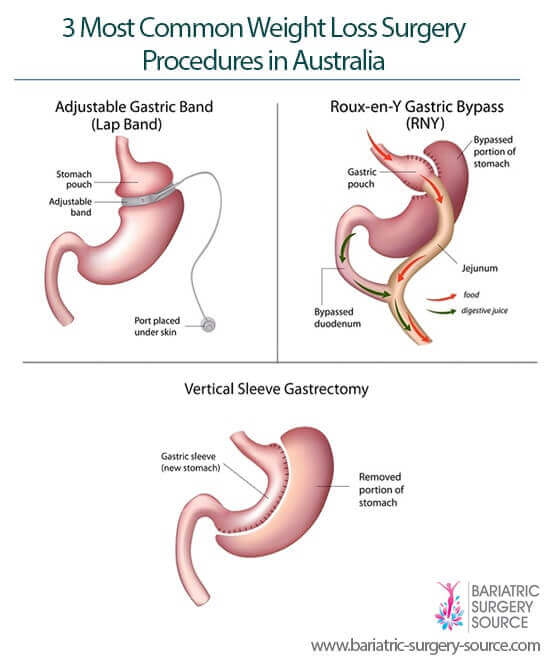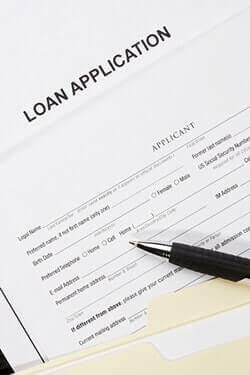Weight loss surgery in Australia:
- Requires your body mass index (BMI) be at least 30
- Includes 4 procedures: gastric sleeve, gastric bypass, Lap-Band, and gastric balloon
- Costs between $2,800 and $18,000 AUD, depending on medical insurance
- Is offered by surgeons in New South Wales, Victoria, Queensland, South Australia, and Western Australia
Read and click the sections below for everything you need to know about getting a weight loss procedure in Australia.
TABLE OF CONTENTS
Click on any of the topics below to jump directly to that section
- How to Qualify
- 4 Procedures to Choose From
- Cost & Insurance
- 4 Steps to Surgery
- Find a Weight Loss Surgeon

SECTION SUMMARY:
- 30+ body mass index (BMI) required for Lap-Band, Sleeve, and Bypass
- 27+ BMI for the gastric balloon
BMI’s between 30 and 39.9 require certain health problems in order to qualify. BMI’s of 40 or higher qualify with or without related health issues. Gastric balloon requires of a minimum BMI of 27.
Click Here to See Your BMISee the chart below for a more detailed breakdown:
| Body Mass Index | Health Problems Required to Qualify |
|---|---|
| 30 or higher | Poorly controlled type 2 diabetes and have a higher risk of cardiovascular disease |
| 35 to 39.9 | One or more obesity-related health problem(s) |
| 40 or higher | No health problems required to qualify for surgery |
Assuming your BMI qualifies, your next step is to decide which procedures may be a fit for you. Click the sections below to learn more.
SECTION SUMMARY:
- Below is a brief description of each of the following procedures

The 3 most common types of bariatric surgery in Australia are (in no particular order):
- Gastric bypass (also called Roux-en-Y or RNY gastric bypass)
- Gastric sleeve (also called vertical sleeve gastrectomy or just “sleeve gastrectomy”)
- Adjustable Gastric Band (commonly called Lap-Band which is a specific brand made by Apollo, formerly Allergan. Other brands include the Swedish Band and Heliogast)
The gastric balloon is also gaining popularity as an "in between" option that is more aggressive than diet and exercise but less aggressive than traditional bariatric surgery.
The links above will take you to a page with everything you need to know about each procedure including average weight loss for each procedure, impact on obesity-related health problems, potential risks and complications, and what life is like after surgery.
Out of pocket costs for each procedure can be found below.
Also review our Types of Weight Loss Surgery page to compare these four along with all other available procedures.

SECTION SUMMARY:
- Your cost with medical insurance: $2,800 – $7,000 AUD
- Your cost without Insurance: $12,000 to $18,000 AUD
- You may be able to use superannuation benefits to pay
- Loans & Tax Savings: Usually available
This following section will cover all the cost, insurance, and financing information you’ll need to make an informed decision about weight loss surgery in Australia.
Your Total Out of Pocket Costs with or without Private Insurance

Your total out of pocket costs will likely fall in the following ranges:
- With Private Insurance: $2,800 – $7,000 after Medicare rebates
- Without Private Insurance: $12,000 – $18,000 after Medicare rebates
The final amount will depend on a number of factors, including:
- Initial surgeon consultation fees (between $100 and $200, a portion for which you can claim a Medicare rebate)
- Type of surgery chosen
- Surgeon’s fees
- Surgical Assistant fees
- Hospital fees
- Anaesthetist’s fees
- Medications prescribed after surgery
Following are surgery-specific ranges currently charged throughout Australia:
- Gastric band surgery cost Australia (Lap-Band):
- With private insurance: $2,500 to $5,500 not including Medicare rebates
- Without private insurance: $10,000 to $16,000 not including Medicare rebates
- Gastric bypass surgery cost Australia:
- With private insurance: $4,000 to $6,000 not including Medicare rebates
- Without private insurance: $16,000 to $18,000 not including Medicare rebates
- Gastric sleeve surgery cost Australia:
- With private insurance: $4,000 to $6,000 not including Medicare rebates
- Without private insurance: $16,000 to $18,000 not including Medicare rebates
- Gastric balloon cost Australia:
- Without private insurance: $5,825 average (insurance typically will not cover the procedure but may cover the gastroscopy [the upper GI tract exam using an endoscope])
Talk with a local qualified surgeon for a more detailed quote. Be sure to ask whether there will be an added charge if additional procedures are required during your surgery.
Private Insurance for Bariatric Surgery in Australia

Private insurance in Australia usually covers bariatric surgery, although you will still have out of pocket fees over and above what the insurance companies cover (between $1,700 and $5,300 after Medicare rebates).
Use the following interactive tool to see the average out of pocket costs for gastric bypass, gastric banding (Lap-Band), and gastric sleeve surgery in your state/territory…
(NOTE: All territories with data are classified as "low cost" because compared to other countries like the United States, most patients have private insurance and therefore pay much lower out of pocket costs)

Tap here to expand a table that summarizes the above data.
| Region | Procedure | Average Cost |
|---|---|---|
| NEW SOUTH WALES | Gastric Bypass | $4,500 |
| NEW SOUTH WALES | Gastric Sleeve | $5,225 |
| NEW SOUTH WALES | Lap-Band | $4,750 |
| NEW SOUTH WALES surgeons surveyed are located in Sydney | ||
| QUEENSLAND | Gastric Bypass | $5,246 |
| QUEENSLAND | Gastric Sleeve | $4,388 |
| QUEENSLAND | Lap-Band | $4,500 |
| QUEENSLAND surgeons surveyed are located in Brisbane and Gold Coast | ||
| SOUTH AUSTRALIA | Gastric Bypass | $3,250 |
| SOUTH AUSTRALIA | Gastric Sleeve | $3,025 |
| SOUTH AUSTRALIA | Lap-Band | $2,917 |
| SOUTH AUSTRALIA surgeons surveyed are located in Adelaide and Barossa Valley | ||
| TASMANIA | Lap-Band | $1,700 |
| TASMANIA surgeons surveyed are located in Hobart | ||
| VICTORIA | Gastric Bypass | $5,160 |
| VICTORIA | Gastric Sleeve | $4,672 |
| VICTORIA | Lap-Band | $4,129 |
| VICTORIA surgeons surveyed are located in Melbourne | ||
| WESTERN AUSTRALIA | Gastric Sleeve | $3,500 |
| WESTERN AUSTRALIA | Lap-Band | $2,200 |
| WESTERN AUSTRALIA surgeons surveyed are located in Perth | ||
Since obesity is considered a pre-existing condition, you will probably have to wait 12 months between joining a health fund and getting approved for surgery.
Note that many surgeons will not perform any surgery other than gastric banding (Lap-Band) if you do not have private insurance.
To get the specific coverage information and your out of pocket costs from your health fund, contact them directly and provide the following Medicare item numbers:
- Gastric banding – Item 31569
- Gastric bypass – Item 31572
- Gastric sleeve (sleeve gastrectomy) – Item 31575
- Duodenal switch – Item 31581
- Reversal of Gastric Banding/Lap-Band (removal or replacement of gastric band) – Item 31584
- Intragastric balloon – There is no item number specifically for the balloon, but you can provide the number for gastroscopy since they may pay for that portion of the treatment – Item 30473
Click here for a full list of Australian health funds and their contact information.
You can also contact your local qualified surgeon for help understanding total costs and how insurance will apply.
Medicare Reimbursement

Medicare will provide some reimbursement for the procedures listed below, although the rebate amount will still leave the majority of costs up to you and your private insurance.
To determine your rebate amount, Medicare applies a set rate to each covered procedure (that is much lower than the actual surgery costs), then they give you a rebate of 75% of that set rate.
Click here to access the Medicare Benefits Schedule (MBS) database and type in the following Item Numbers for current reimbursement levels for each procedure:
- Gastric banding – Medicare Benefits Schedule – Item 31569
- Gastric bypass – Medicare Benefits Schedule – Item 31572
- Gastric sleeve (sleeve gastrectomy) – Medicare Benefits Schedule – Item 31575
- Duodenal switch – Medicare Benefits Schedule – Item 31581
- Reversal of Gastric Banding/Lap-Band (removal or replacement of gastric band) – Medicare Benefits Schedule – Item 31584
If you need help determining Medicare rebate amounts, talk with your local surgeon.
Accessing Superannuation Benefits for Weight Loss Surgery Australia

The Department of Human Services (DHS) will consider the early release of your superannuation funds on what they call "specified compassionate grounds" for a medical treatment that:
- Treats a life-threatening illness
- Alleviates acute or chronic pain
Obesity may fall under one or both of these categories. And since weight loss surgery is recognized as an effective medical treatment for obesity, the DHS may agree to an early release of your funds to help with your surgery payment.
Click here to go to the DHS website for more information.
Personal Finance Bariatric Surgery Australia

Financing is usually available for bariatric surgery in Australia either directly through your surgeon (payment plan) or through a third party lender.
The most commonly recommended third party lender in Australia is Mac Credit. Their plan maximums easily cover all of the costs associated with any weight loss surgery procedure, and their policy is to process all applications within 24 hours of receiving all requested information. Click here to submit an online application.
GE’s CareCredit Australia used to be recommended by surgeons (and is still listed on some practices’ websites) but it is no longer an option. GE’s CareCredit Australia website suggests using Gem Visa’s interest free credit card instead. Click here to learn more.
For other ideas, see our Financing Bariatric Surgery page.
Tax Offset for Weight Loss Surgery Australia

If your out of pocket expenses for bariatric surgery (and all other net medical expenses) are over the Australian Taxation Office (ATO) threshold, you can claim an offset on your tax return.
According to the ATO…
“To claim the net medical expenses tax offset in your tax return, you will need to know the total medical expenses you incurred for yourself and your dependants. You then deduct any refunds from Medicare, your health fund or any other reimbursements that relate to those expenses received during the financial year.”
SECTION SUMMARY:
- Do your necessary initial homework
- Create an initial list of potential surgeons
- Narrow down your list
- Interview surgeons and make your selection
Finding the right surgeon is essential for short- and long-term weight loss surgery success. Following are the steps to take to choose the surgeon that’s right for you (links will take you to a different page):
- Step 1: The necessary homework
- Step 2: Creating your initial list of potential surgeons
- Step 3: Narrowing your list
- Step 4: Interviewing and moving forward with your surgeon
To confirm that your surgeon is properly trained, be sure they are an active Fellow of the Royal Australasian College of Surgeons (FRACS).
To check your surgeon’s standing, click here and enter your surgeon’s name. As long as your surgeon is listed you can be confident that they are in “active” standing.
SECTION SUMMARY:
- You can ask a local bariatric practice for a free insurance check or cost quote
- You can attend a free in-person seminar or an online webinar offered by a local weight loss surgeon
- You should schedule a phone or in-person consultation (both often free), if you are interested in learning more about weight loss surgery
About Dr. Anthony Clough
Dr. Anthony Clough is a bariatric surgeon in Melbourne performing the full range of surgical solutions to weight loss including gastric banding, sleeve gastrectomy, gastric bypass, biliopancreatic diversion as well as revisional surgery.
Dr. Clough has extensive training in advanced minimally invasive surgery as applied to the upper abdomen and abdominal wall. He has a particular interest in laparoscopic surgery involving the stomach and oesophagus which includes bariatric surgery, hiatus hernia repair and anti-reflux surgery.



